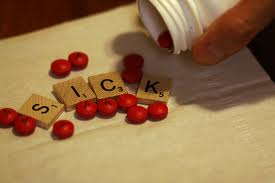Is debt a disease?
Some of you who are over-spending have a real problem.
In fact, you have a sickness, of sorts. Now before you think that I’m offering you a clinical diagnosis, let me say that I’m talking about a personal belief I have about people with massive credit card debt due to over-spending.
I feel strongly that excessive debt is the worst possible financial cancer you can have. In fact, I believe that debt for many people is a byproduct of a terrible disease – an insidious malady known as consumerism – and as a symptom of a disease, debt should be treated as such.
If you think about it, many aspects of chronic spending, and the debt that results from it, are really no different from alcoholism.
Still wondering if debt is a disease? Check out the following 10 similarities:
Excessive debt and alcoholism both:
1. Generate stress and physical illness (migraines, ulcers, etc. can result from money worries)
2. Tear families apart (70% of all couples that divorce say financial strife was a major problem in their marriage)
3. Produce short-term euphoria or escapism from daily problems
4. Can be generational (Don’t you know people whose behavior just mimics what their mom or dad did?)
5. Make individuals feel shame, guilt and embarrassment
6. Have complex underlying or root causes for the behavior
7. Cause victims to feel out of control with their actions
8. Produce hangovers (for the alcoholic, a drinking binge leads to a physical hangover; for the shopaholic, a spending binge creates a debt hangover that lasts months or years)
9. May require individuals to change their habits, their friends, the places they frequent, etc. to reduce temptations
10. Have similar and predictable phases of deterioration:
- Denial
The phase where the person refuses to admit he/she has a problem, as in: “I don’t have too much debt,” “I don’t shop too much” or perhaps: “I can handle my bills.”
- Worsening of the problem
When the debts mount, late fees occur, bill collectors call, etc.
- Hitting ‘rock bottom’
Characterized by traumatic financial events, such as foreclosure, bankruptcy, personal or business lawsuits, and so forth.
- Intervention
Sometimes the intervention is from within the family, as when a husband takes away his wife’s credit cards. Other times, the intervention/help comes from an external source, such as when a person voluntarily goes to a debt management program.
Now that you can see the common areas between excessive consumerism and alcoholism, is it any wonder that debt has such a stranglehold on you?
But don’t despair. You don’t have to remain drunk with debt.
You can kick your spending addiction, if that is what has put you in this mess. Each of you can break the cycle of debt. With the right know-how and some positive action, you truly can fix your finances, once and for all.








